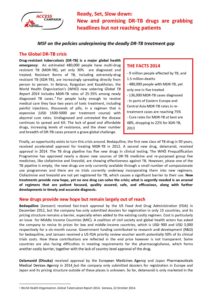Abstract
The Global DR-TB crisis Drug-resistant tuberculosis (DR-TB) is a major global health emergency: An estimated 480,000 people have multi-drug resistant TB (MDR-TB), yet only 30% are diagnosed and treated. Resistant forms of TB, including extremely-drug resistant TB (XDR-TB), are increasingly spreading directly from person to person. In Belarus, Kyrgystan and Kazakhstan, the World Health Organization’s (WHO) new sobering Global TB Report 2014 includes MDR-TB rates of 25-35% among newly diagnosed TB cases.a For people lucky enough to receive medical care they face two years of toxic treatment, including painful injections, thousands of pills, in a regimen that is expensive (USD 1500-5000 per treatment course) with abysmal cure rates. Undiagnosed and untreated the disease continues to spread and kill. The lack of good and affordable drugs, increasing levels of resistance, and the sheer number and breadth of DR-TB cases present a grave global challenge.
Finally, an opportunity exists to turn this crisis around. Bedaquiline, the first new class of TB drug in 50 years, received accelerated approval for treating MDR-TB in 2012. A second new drug, delamanid, received approval in 2014. The TB drug pipeline has five new drugs in clinical testing. The WHO Prequalification Programme has approved nearly a dozen new sources of DR-TB medicine and re-purposed group five medicines, like clofazimine and linezolid, are showing effectiveness against TB. However, phase one of the TB pipeline is empty, the new drugs are only currently available through a small number of compassionate use programmes and there are no trials currently underway incorporating them into new regimens. Clofazimine and linezolid are not yet registered for TB, which causes a significant barrier to their use. New treatments provide new hope, yet no one drug can solve the crisis; what is urgently needed is an arsenal of regimens that are patient focused, quality assured, safe, and efficacious, along with further developments in timely and accurate diagnosis.



